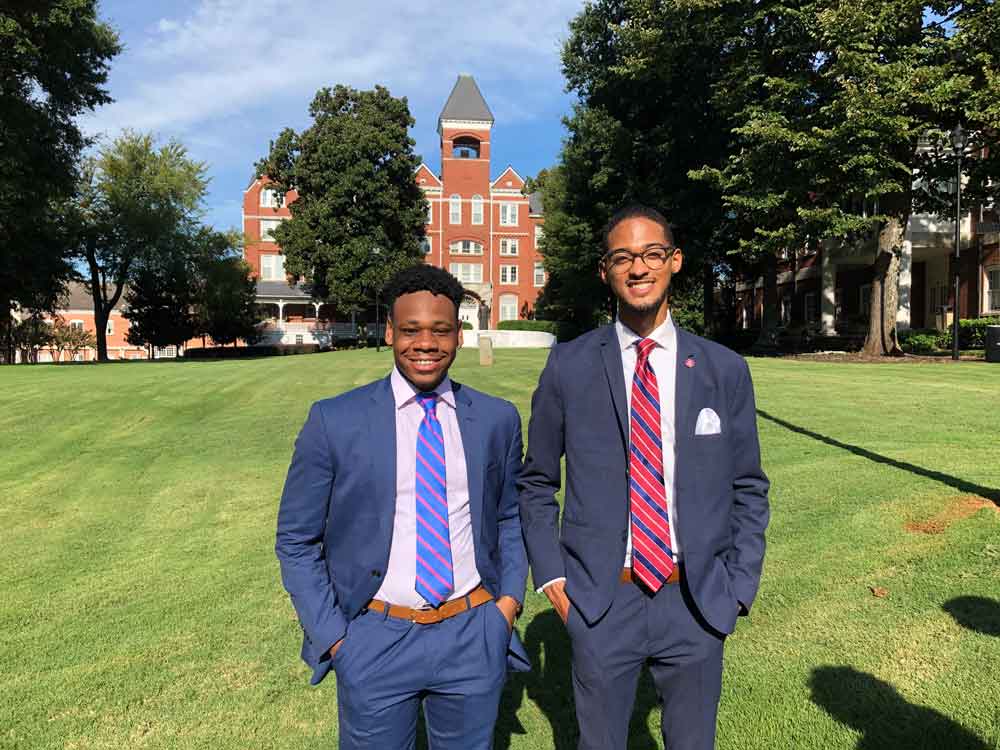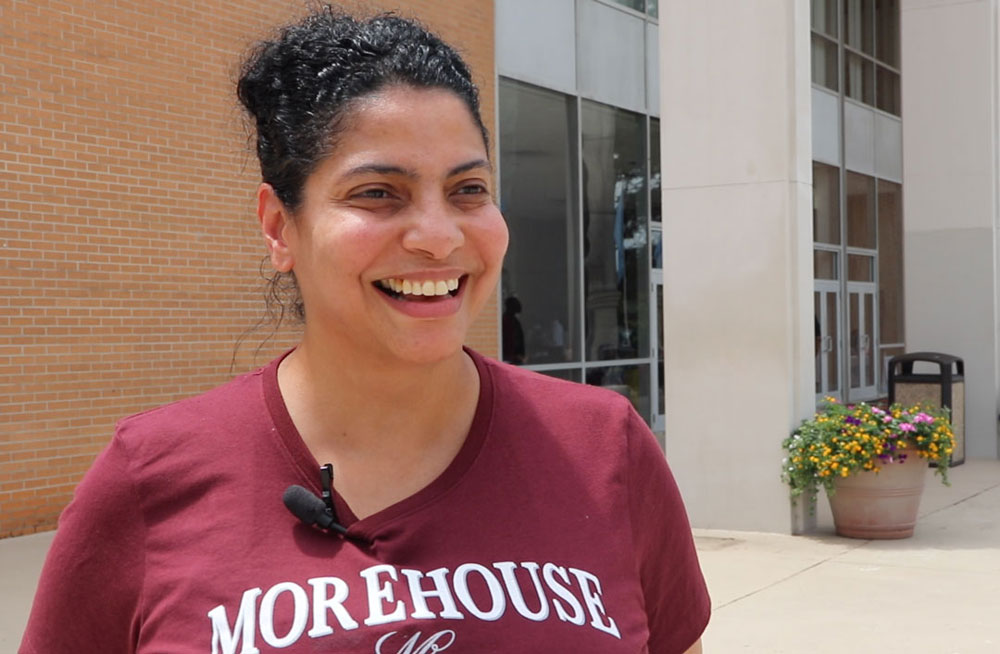When single mother Elizabeth Cain sent her son to college she did what many American families do to bridge the gap between grants, student loans and the cost of attendance by taking out a federal Parent PLUS Loan.

Morehouse Student Government Association members junior Cameron Reese (left) and senior John “Trey” Bowers III get to campus early to prepare for the new school year. (Kelly Rissman/Medill)
Her son Chance entered Morehouse College, a historically black college, this year. Cain is a self-employed educational therapist and is in a master’s degree program where she has accumulated $11,000 in student debt. Now, the New Yorker has taken on a $39,000 Parent PLUS Loan for her son.
“I try not to worry about that stuff because it will consume me,” Cain said. “I try to take it one day at a time.”
While the PLUS Loan makes it easy for parents to help their kids pay for college, the program’s administrators aren’t required to check whether families can handle the debt.
It’s a problem that hits African-American parents particularly hard.
For many students and their parents, the federal loan program for parents is often the final piece of the financial package needed to realize their college dream. While it sounds like a lifeline, the PLUS program can weigh down families, especially low-income black families, for generations.
“It puts a real strain on any social and economic mobility that can happen for black families in particular,” said Colleen Campbell, director for postsecondary education at the Center for American Progress. “I think that once you add Parent PLUS debt on top of whatever student debt the student is accruing, that wipes out any potential advantages or gains that the parent has made in terms of their own wealth.”
The Parent PLUS Loan program was introduced in the 1980s as a way for middle- and upper-income parents to keep their assets liquid while helping their children pay for college. It has since become more popular among low-income parents because administrators only check a borrower’s credit history, not their ability to repay the loan.

Morehouse students attend a session on scholarships at Martin Luther King Jr. International Chapel during new student orientation. (Josephine Chu/Medill)
Few low-income white families take out the loan. Just 1 in 10 white Parent PLUS Loan borrowers earn $30,000 or less. In contrast, 40% of black borrowers make that much or less.
“It’s a very loose lending standard,” Campbell said.
In 2011, the federal government had tightened the lending standard making it more difficult for parents to get the loans they needed to put their kids through college. HBCUs and other schools pushed the government to relax the standard and soon the PLUS money flowed again.
Angela Carter also sent her son Isaiah to Morehouse College. She said that a PLUS Loan is worth the risk. In the long run, Carter said, it was the only way her son would get the level of education that would then give him the opportunity to go to an Ivy League grad school.
“It’s a chance we have to take,” Carter said.
As an alumnus of another historically black university Clark Atlanta, Carter wanted her son to attend Morehouse. She feared her son might feel isolated at other schools and hoped he will benefit from the sense of brotherhood that the college fosters.
“We also wanted him to learn the rich history of African-Americans that have gone on to make a difference in the world,” Carter wrote in a text message.
New York University professor Caitlin Zaloom said that the prestige factor attracts many black students to HBCUs. She added that many HBCUs cannot depend on a base of graduates for donations to the same degree as wealthier private colleges. That leads to higher tuition and a greater debt burden on students and their families.
The wealth gap in America between black and white families is evident in college spending too. In addition to having less wealth and income than other Americans, black families cannot always borrow money from other sources including grandparents or other family members, Zaloom said.
“Education is an incredibly important value for African-American families who are striving for upward mobility,” Zaloom said. “They just have to do way more to get their kids to and through college than other groups.”
Black families can feel the cost of a college degree for generations.
Brunella Jeter took out a Parent PLUS Loan for her daughter Shaniqua, who attended the University of Texas nearly a decade ago.
“Had I known what a Parent PLUS Loan entailed, I never would have signed it. I would have made her just get all her financial aid and let her be responsible for college,” Jeter said.
Now Shaniqua is following the same path as her mother. She also took out a PLUS Loan so her son can attend Morehouse this fall.
“Now I have to find a way to help my daughter fund this bill” while also continuing to pay off her own $120,000 PLUS Loan, Brunella Jeter said.
Lodriguez Murray of the United Negro College Fund thinks the federal government should reform the PLUS program and allow income-based repayments, which would limit loan payment amounts to what families can afford. Unlike other federal loans, Parent PLUS Loan repayments cannot be adjusted based on a borrower’s earnings.
Scholarship organizations and charities should also help the neediest students, he said.
Rachel Fishman, deputy research director with the Education Policy Program at New America, suggested a limit on the size of PLUS Loans based on household income, and more federal programs for low-income students. Too often, she said, families are borrowing more money than they can afford.

Morehouse mom Carmelita Farrah discusses Parent PLUS Loans outside of Martin Luther King Jr. International Chapel at Morehouse College. (Josephine Chu/Medill)
Morehouse parent and Chicago resident Carmelita Farrah called PLUS Loans a “ripoff,” but said the program was the only way she could afford to put her son through college.
“Where we’re from, young black boys who are 18, 19 years old, they don’t make it. They get shot,” Farrah said. “The obstacles are stacked against him as a black man. So, what will set them apart? Hopefully an education, after that, a career. Because it’s a struggle. It really is.”

